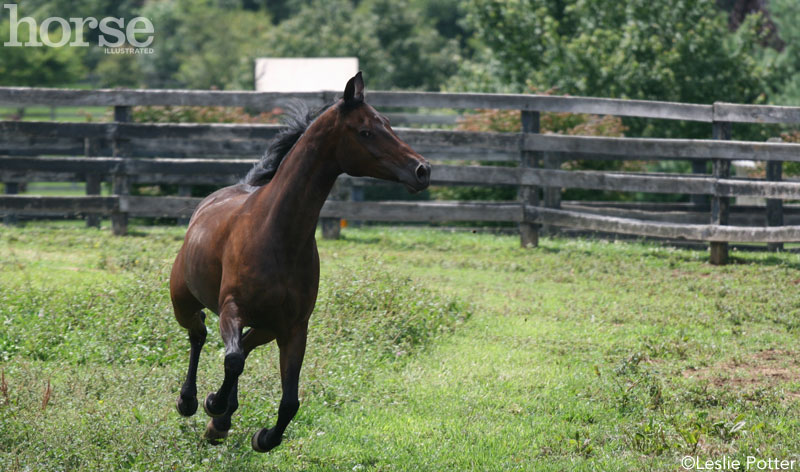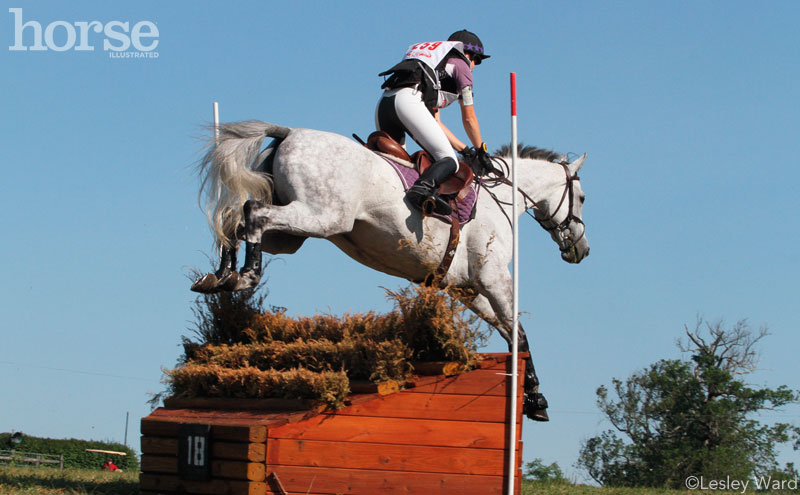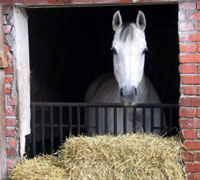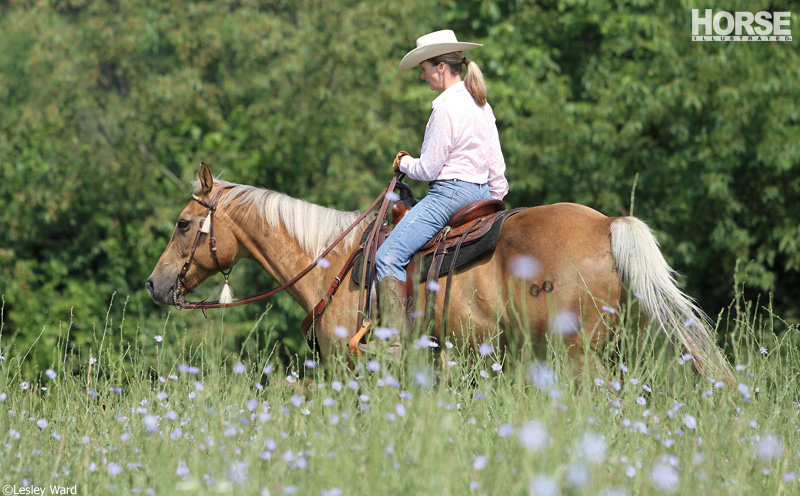
Changing a horse’s living arrangements can create a stressful situation.
Stress. We all suffer from it to some degree, and some of us deal with it better than others. The same goes for our horses. Diet, environment, training, competition and social situations can be causes for stress in horses. There are also many manifestations of equine stress. From behavioral issues and decreased performance to ulcers and negative effects on the immune system, stress can be a serious problem for your horse. Let’s take a closer look at equine stress: what causes it and how we can help prevent it.
What is Stress?
First, not all stress is bad. In fact, an animal’s natural reactions to stress are necessary for life. Stress is what causes our horses to be on high alert in the pasture when a strange dog walks the fence or when a bicycle rushes by on a trail ride. Short bouts of stress are required for survival, but prolonged stress has negative effects on overall health.
What exactly do we mean when we say a horse is stressed? Stress is a physiologic adaption designed to elevate an animal’s responses to conditions that require a heightened level of clarity, strength, and mental acuity, says Sam Hurcombe, BVMS, Dipl. ACVIM, clinical associate professor of equine emergency and critical care at Cornell’s College of Veterinary Medicine. The nervous system works in tandem with the adrenal glands to produce a cascade of hormones that results in what we identify as stress. This is the same in both humans and horses.
As with most biological processes, the stress scale is a continuum. Most people have heard of the “fight or flight response,” which is a quick burst of the hormone adrenaline that allows for a reaction to immediate threats. This is a form of acute stress, designed for perceived life or death situations. There is also chronic stress, which is the result of a horse encountering some milder form of change in his environment. Stress hormones, such as cortisol, increase when a horse encounters change. If the horse is able to successfully adjust to the change, stress hormones decrease. If a horse can’t cope or struggles with the change mentally or physically, chronically elevated stress hormones cause problems. This is what we mean when we say a horse is stressed.
“Chronic stress leads to negative effects on the body,” says Hurcombe. He explains that when a horse’s body is chronically exposed to elevated levels of stress hormones, his health is compromised, leading to slow healing, weight loss, and poor performance.
These changes can also hamper the immune system, making the horse more susceptible to other diseases.
Causes of Stress
“Horses are naturally gregarious creatures,” says Hurcombe. “Any horse with a rapid change to his environment, including social structure, housing, and living space can suffer from stress.”
Other causes of stress can include changes in diet or exercise. Illness or pain is another cause, particularly colic or an invasive surgical procedure that requires extensive rehabilitation time in a hospital or strict stall rest.
As with humans, some individual horses can be more prone to suffering from chronic stress than others. High-strung horses tend to be more reactive to change in their environment, which may make them more predisposed to stress. However, quiet, stoic horses should not be discounted as subjects of stress, particularly when sick or in pain.
Top-performing equine athletes are particularly prone to stress. “Workload is directly proportional to stress load,” says Hurcombe. A common example of this is the racehorse. Horses that are racing are more stressed than those that are just in training. Likewise, horses in training are more stressed than those on rest. Some studies have shown that up to 90 percent of racing Thoroughbreds suffer from gastric ulcers, one clinical sign of stress.

High-performance equine athletes are particularly prone to stress.
Signs of Stress
Outward clinical signs of a stressed horse vary based on the individual. Most commonly, stressed horses have a decreased appetite and some will begin to lose weight. Owners may also notice a change in personality. Some horses may become reluctant to work or develop a sour attitude, becoming unmotivated or acting burned out. Others may begin to develop stereotypic behaviors, just as weaving or stall walking.
Physiologically, chronically stressed horses are at higher risk of contracting infectious disease, particularly respiratory disease, due to the negative effect that stress hormones have on the immune system. These horses may develop a rough hair coat and intermittently have diarrhea or loose stool. Stressed horses are also at high risk for developing gastric ulcers (read more about gastric ulcers here).
How to Help Your Stressed Horse
If you suspect your horse might be chronically stressed, ask your vet to conduct a physical exam. This will help rule out any medical causes of stress or hidden sources of pain. Diagnostics can also be used to look for gastric ulcers.
From a management standpoint, there are many things you can do to help decrease stress in your horse’s life. “Horses appreciate routine,” says Hurcombe. “Keep care and management consistent as much as possible.”
Housing
In terms of housing, keep your horse out on pasture when you can. Whether your horse is in a stable or out in the field, be aware of social interactions. Even the position of a horse’s stall within a facility could be a cause of stress, says Hurcombe. Reassess your horse’s location any time something changes in the environment, such as when a new horse enters the facility or the herd out in pasture.
Nutrition
Nutrition is another key factor in the management of equine stress. Good-quality, balanced nutrition and peaceful, friendly horses within the herd is key, says Hurcombe. Ample forage is important to satisfy a horse’s natural grazing behavior. Horses only fed twice daily on concentrate with limited additional roughage are at higher risk for gastric ulcer development. Both the lack of roughage and subsequent ulcer formation increase stress. Often management, feed, and exercise habits revolve in a vicious stress-creating cycle. The causes of this chain reaction perhaps don’t matter as much as breaking the cycle. If your horse is stalled without access to pasture, feed smaller meals more frequently and make sure your horse has plenty of access to hay.
Fitness
Conditioning is another tool against stress. Appropriate training and exercise for the level of work the horse is expected to perform is one crucial way to help prevent and combat stress, says Hurcombe. Consistent exercise programs not only help develop fitness and prevent overuse injuries but also help ensure you don’t inadvertently demand a level of physical performance that results in chronic stress for the horse.
Traveling Smart
Frequent travel can also exacerbate stress in horses. If you have a hectic show season or are planning lots of trail rides and other adventures, try as best you can to maintain a schedule similar to home in terms of feeding and resting. Avoiding abrupt diet changes when on the road helps, too. Don’t forget to bring feed and hay from home.
Routine Care
Making sure your horse is up to date on vaccines, deworming, and is in otherwise good general health helps the body combat the effects of stress more efficiently. Talk to your vet if you have concerns about how your horse’s lifestyle may be causing him stress.
Because so many causes of stress in horses originate directly from how we manage them, sometimes all it takes is a small or gradual change to really help your horse live a relatively stress-free life.
This article originally appeared in the June 2015 issue of Horse Illustrated magazine. Click here to subscribe!





Horse like being outside, so changes bother them.